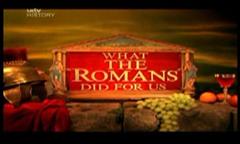What the Romans Did for Us
| What the Romans Did for Us | |
|---|---|
 |
|
| Genre | Documentary |
| Directed by | Inge Samuels |
| Presented by | Adam Hart-Davis |
| Composer(s) | Deborah Mollison |
| Country of origin | United Kingdom |
| Original language(s) | English |
| No. of episodes | 6 |
| Production | |
| Producer(s) | |
| Editor(s) | Peter Parnham |
| Running time | 23 minutes |
| Distributor | BBC |
| Release | |
| Original network | BBC Two |
| Original release | 6 November – 11 December 2000 |
| Chronology | |
| Followed by | What the Victorians Did for Us |
| External links | |
| Website | |
What the Romans Did for Us, is a 2000 BBC documentary series "looking at the innovations and inventions brought to Britain by the Romans". The title of the programme is derived from the cult movie Monty Python's Life of Brian, referencing the famous scene where the People's Front of Judea discuss "What have the Romans done for us?"
In 2003, the series was re-edited into 10-minute sections for broadcast as programme fillers.
Nominated for Best Feature at the British Academy Television Awards 2001.
These are the White Cliffs of Dover, and this must have been the first bit of Britain that the Romans saw when they came to invade. In fact they came in force in about May of AD 43. That wasn’t the first time they had visited the islands because Julius Caesar had come over a hundred years earlier, but he only stayed for a few weeks. In AD 43 the Romans meant to stay.
After hundreds of years of occupation many generations of people in Britain had grown up surrounded by Roman culture, and after a long period of stability that culture was showing visible signs of wealth, success and good living.
In this series I’m going to see what the Romans brought with them and what they left behind when finally they went home 400 years later. Why did they come? Well, partly for the glory, partly for the farmland, and for the minerals like copper, lead and gold, and simply to trade. We'll be returning to those things later in the series, but for the moment lets see how they established their first foothold.
Within 30 years of the invasion there were 60,000 Roman troops in Britain, they had come from some of the most advanced places in Europe, and to them this sort of settlement must have seemed primitive. This is the story of how they transformed the landscape and laid the foundations for the countryside and the cities that we have today.
When Britain became Roman the Britons gained access to the finest goods the Empire could offer. The Roman economy was fuelled by trade, but they had trouble meeting the demand for luxury goods like jewellery. What they needed was the raw materials, the ores, and that is one of the principal reasons that the Romans came to Britain and stayed here for 400 years, but this trade would have been impossible without their amazing network of roads.
...
Wikipedia
